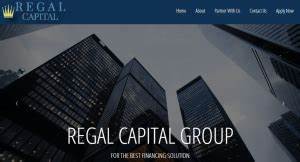Regal Capital Group Scam Exposed: Concerning Facts About Regalgroup.com
Have you ever heard of Regal Capital Group and the potential scams associated with it? In this guide, we’ll uncover the truth behind the Regal Capital Group scam, how it operates, and what you need to watch out for to keep your finances safe.

What Is The Regal Capital Group Scam
If you’ve come across those pesky calls from people named “Mary,” “Mark,” or “Tara” who leaves you voicemails about prequalified business loans? Yeah, those. Then you’ve seen an example of the Regal Capital Group Scam. They promise you a business line of credit for a hefty sum, but here’s the catch – it’s a scam!
How It Works
These scammers are using VoIP numbers from all over the place, and they’ve been at it for quite some time. They reel you in with those enticing words about quick funding and low interest rates, but it’s all a trap. If you give them your business tax info or EIN number, they can do some nasty stuff with it, like selling it to the highest bidder overseas. Definitely not something you want to get mixed up in.
So, folks, remember to stay vigilant and don’t fall for these slick scams. Hang up on those calls, and don’t give out any sensitive business info. It’s all about keeping your hard-earned money safe from these tricksters!
It’s like a never-ending barrage of calls from “Mary,” “Mark,” “Beth,” “Tara,” and who knows who else. They’re using sneaky VoIP phone numbers from all over the U.S.
It usually starts with a voicemail saying something like, “Hey, this is [Insert Name] calling you back again. Your business has been prequalified for a business loan.” And let me tell you, they don’t just stop at one call. Nope, they’ll ring your phone more than ten times a day!
And the worst part? Trying to opt out of these calls can feel like an uphill battle. These scammers just keep coming. It’s like they’re playing a never-ending game of cat and mouse. So, folks, stay vigilant, and don’t let those scammers get the best of you! Hang up on those calls and keep your info safe.
Red Flags To Watch Out For
- Upfront Payments: If they’re asking you to pay any money upfront to claim your prize, it’s a scam. PCH never requires winners to pay anything before receiving their winnings.
- Unexpected Notifications: If you receive a notice about a massive prize and you haven’t participated in any recent PCH contests, that’s suspicious. PCH typically shows up in person for big prizes, and smaller ones are sent via certified mail.
- Wiring Money Back: If you’re told to wire back a portion of the prize money, beware. Scammers often send fake checks and ask you to send real money, leaving you with a big loss when their fake check bounces.
- Personal or Financial Data Requests: Legitimate sweepstakes will never ask for sensitive information like your bank account details or payments in the form of gift cards.
- Check Contact Information: Verify any provided phone numbers. If you’re unsure, contact PCH directly through their official customer service channels.
Tips To Avoid Being Scammed
- Be careful with unexpected emails and video graphics about refunds. If they look weird, have mistakes, or come from strange addresses, watch out.
- Don’t click any links or download stuff from these emails. They could be bad news.
- Check if it’s real by contacting the real folks through their official website or customer service.
- Keep your computer safe with antivirus updates
What To Do If You Have Been Scammed
- Contact your bank or credit card issuer immediately.
- Inform your bank or credit card issuer about the unauthorized transaction and request a chargeback.
- Change your online passwords: If you have shared your password with the scammer, change your password immediately.
- Also be sure to use a strong and unique password for each account.
- Report the scam: You can report the scam to the Federal Trade Commission (FTC) or your local law enforcement agency.
- Check your credit rreport: Monitor your credit report for any suspicious activity.
- Stay vigilant: Be alert for any other phishing scams or suspicious emails, and do not share any sensitive information
Conclusion
In conclusion, Regal Capital Group Scam tricks people with false promises of financial gains, but it’s a deceptive scheme. Stay cautious and don’t be quick to trust such offers. If it sounds too good to be true, it probably is.
